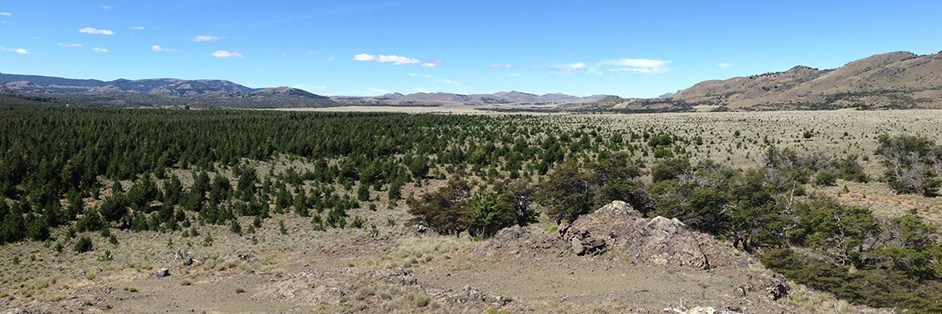Faculty Profile
 Martin A. Nuñez
Martin A. Nuñez
Associate Professor
Department of Biology and Biochemistry
Research Division: Ecology and Evolution (Primary)
Office: Science & Research 2, 221E
Contact: nunezm@uh.edu - 713-743-1114
Education: Ph.D., University of Tennessee
Google Scholar Profile
Website

Dr. Martin A. Nuñez is an ecologist interested in the study of biological invasions. Invasions provide us the possibilities of testing many ecological and evolutionary theories, and they give us the possibility of applying ecological knowledge to the management of these serious threats. Invasive species can also provide crucial information to understand and face other global challenges such as climate change. These theoretical and applied challenges are what fascinate Nuñez about the study of invasions.

Some more specific topic of his interest include:
Belowground Ecology: How belowground organisms influence ecological processes. These include the role of mycorrhizal fungi on plant invasion.
Forestry with Invasive Species: How to control and improve the management of invasive species such as pine trees.
Chemical Ecology: How changes in plant chemistry affect the process of plant invasion?
Impact of Invasive Species: What are the impact of invasive species? How can we reduce the negative impacts?
- Nuñez M.A. 2025. A Pocket Guide to Scientific Writing and Publishing. MNRD Publishing, 149pp.
- Moyano, J., P. García‐Díaz, B. Langdon, S. C. Palmer, P. Caplat, X. Lambin, A. Pauchard, and Nuñez M.A. 2025. Remove saplings early: Cost‐effective strategies to contain tree invasions and prevent their impacts. Journal of Applied Ecology 62:661-676.
- Nuñez M.A, T. August, S. Bacher, B. S. Galil, P. E. Hulme, T. Ikeda, M. A. McGeoch, A. Ordonez, S. Rahlao, and T. R. Truong. 2024. Including a diverse set of voices to address biological invasions. Trends in Ecology & Evolution 39:409-412.
- Nuñez M.A, Torres, A., T. Morán‐López, M. A. Rodriguez‐Cabal, and Nuñez M.A. 2024. Inverse priority effects: The order and timing of removal of invasive species influence community reassembly. Journal of Applied Ecology 61:51-62. (Winner of the British ecological Society 2025 Southwood Prize).
- Zenni, R. D., J. Barlow, N. Pettorelli, P. Stephens, R. Rader, T. Siqueira, R. Gordon, T. Pinfield, and Nuñez M.A. 2023. Multi‐lingual literature searches are needed to unveil global knowledge. Journal of applied Ecology. 380-383.
- Nuñez M.A, Chiuffo, MC, Pauchard, A, & Zenni, R. 2021. Making ecology really global. Trends in Ecology & Evolution. 36: 766-769.
- Nuñez M.A, Davis KT, Dimarco RD, Peltzer DA, Paritsis J, Maxwell BD & Pauchard A. 2021 Should tree invasions be justified as a way to mitigate climate change in treeless ecosystems? Frontiers in Ecology and the Environment. 19: 334-341.
- Nuñez M.A, Pauchard A & Ricciardi A. 2020. Invasion Science and the Global Spread of SARS-CoV-2. Trends in Ecology & Evolution 35:642-645.
- Rudgers J, Afkhami M, Bell-Dereske L, Crawford KM, Kivlin SN, Mann M & Nuñez M.A. 2020. Climate Disruption of Plant-Microbe Interactions. Annual Review of Ecology and Systematics.
- Nuñez M.A, Barlow J, Cadotte M, Lucas K, Newton E, Pettorelli N, & Stephens PA. 2019. Assessing the uneven global distribution of readership, submissions and publications in applied ecology: obvious problems without obvious solutions. Journal of Applied Ecology 56:4-9.
- Nuñez M.A, Chiuffo MC, Torres A, Paul T, Dimarco RD, Raal P, Policelli N, Moyano J, García RA, van Wilgen BW, Pauchard A & Richardson DM. 2017. Ecology and management of invasive Pinaceae around the world: progress and challenges. Biological Invasions 19(11): 3099-3120.
- Kuebbing SE & Nuñez M.A. 2016. Invasive non-native plants have a greater effect on neighboring natives than other non-natives. Nature Plants 2: 16134.
- Hayward J, Horton TR & Nuñez M.A. 2015. Ectomycorrhizal fungal communities co invading with Pinaceae host plants in Argentina: Gringos bajo el bosque. New Phytologist 208(2): 497-506.
- Kuebbing SE & Nuñez M.A. 2015. Negative, neutral, and positive interactions among nonnative plants: Patterns, processes and management implications. Global Change Biology 21(2): 926-934.
- Nuñez M.A & Pauchard A. 2010. Biological invasions in developing and developed countries: does one model fit all? Biological Invasions 12(4): 707-714.
- Nuñez M.A, Horton T. R & Simberloff D. 2009.Lack of belowground mutualisms hinders Pinaceae invasions. Ecology 90(9): 2352-2359.
Honors & Awards
Research.gov "best researchers" and "Leader in Ecology and Evolution" Award
Excellence in Restoration Research Award, Texas Society for Ecological Restoration, 2022
50-in-5 Faculty Award for high impact scientific publications, University of Houston, 2022
2018 W.S. Cooper Award from the Ecological Society of America for the paper "Disturbance is the key to plant invasions in cold environments." Proceedings of the National Academy of Sciences 113:14061-14066. The W.S. Cooper Award is given to honor an outstanding contribution in geobotany, physiographic botany, plant succession, or the distribution of organisms along environmental gradients.
Academia Nacional de Ciencias Exactas, Físicas y Naturales (National Academy of Sciences of Argentina). Estímulo 2014 Award “Lorenzo R. Parodi” in Biological Sciences (one given per year to an outstanding biologist under 40 years).
Science Alliance Award, Division of Biology, University of Tennessee, 2007.
Merit Award, University of Tennessee, Department of Ecology & Evolutionary Biology, 2006, 2007, and 2008.
Organizations, Outreach, Boards, Memberships
- SACNAS (also Faculty mentor of the UH Chapter)
- Advisory Board, Trends in Ecology and Evolution, 2021-present
- Senior Editor, Journal of Applied Ecology, 2016-Present
- Associate Editor, Biological Invasions (journal), Springer Netherlands, September 2010-Present
- Coordinating Lead Author, IPBES (Intergovernmental Science-Policy Platform on Biodiversity and Ecosystem Services)
- Member, Ecological Society of America
- Foreign Member, Sociedad de Ecología de Chile
- Member, Sociade de Ecología de Argentina
- Member, British Ecological Society